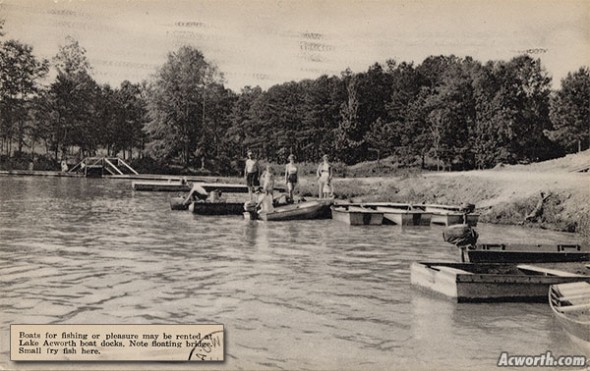 Resting on the foothills of the North Georgia mountains, Acworth is known as “The Lake City” and is located just 35 miles north of Atlanta. The area now known as Acworth was first settled by the Cherokee Nation. In 1845, the Western and Atlantic Railroad began operation in Atlanta and began laying tracks towards Chattanooga. The first water stop north of Atlanta was Northcutt Station. A railroad engineer named Joseph Gregg later renamed the station after his home town of Acworth, New Hampshire. On December 1, 1860, the area in a half-mile radius surrounding Northcutt Station was incorporated into the City of Acworth.
Resting on the foothills of the North Georgia mountains, Acworth is known as “The Lake City” and is located just 35 miles north of Atlanta. The area now known as Acworth was first settled by the Cherokee Nation. In 1845, the Western and Atlantic Railroad began operation in Atlanta and began laying tracks towards Chattanooga. The first water stop north of Atlanta was Northcutt Station. A railroad engineer named Joseph Gregg later renamed the station after his home town of Acworth, New Hampshire. On December 1, 1860, the area in a half-mile radius surrounding Northcutt Station was incorporated into the City of Acworth.
Less than two years later, the Civil war reached Acworth when James Andrews and his crew stole “The General” and raced through the city in what would be known as “The Great Locomotive Chase.” Later during the war, General Sherman was headquartered in Acworth for several days. In November of 1864, many Acworth buildings were burned as a result of Sherman’s Atlanta Campaign.
Tracing the Roots of this Charming Georgia Town
Nestled in the picturesque landscapes of Georgia, Acworth is a town steeped in history and charm. With its roots dating back to the early 19th century, Acworth has witnessed the ebb and flow of time, shaping its character and leaving behind a legacy worth exploring.
The Founding Years
The origins of Acworth can be traced back to the early 19th century when the town was established as a railroad town. The development of Acworth as a key transportation hub was closely tied to the construction of the Western and Atlantic Railroad.
In the 1830s, the state of Georgia embarked on an ambitious project to create a railroad connecting the port of Savannah with the Midwest. The Western and Atlantic Railroad was envisioned as a crucial link between the Atlantic Ocean and the emerging western territories.
During the planning stages of the railroad route, it was determined that a water stop north of Atlanta, and later a depot and maintenance facility were needed at the base of the Allatoona Pass, a strategic geographical location in the region. This decision led to the establishment of a town that would later be known as Acworth.
The town’s name was derived from an influential early settler and railroad engineer, Joseph Gregg. The name “Acworth” was chosen as a tribute to his hometown in New Hampshire. It is said that Gregg’s suggestion of the name was accepted in exchange for him donating land for the depot.
With the construction of the railroad depot and the completion of the Western and Atlantic Railroad, Acworth began to flourish. The town became a vital stop along the railroad line, serving as a transportation hub for both passengers and freight.
The presence of the railroad spurred economic growth and development in Acworth. Businesses, shops, and hotels sprung up around the depot to cater to the needs of travelers and railroad workers. The town became a bustling center of trade and commerce.
The Civil War and Acworth
The Civil War had a profound influence on Acworth as the town became a strategic location during the conflict. Situated along the Western and Atlantic Railroad and at the base of Allatoona Pass, Acworth was a critical point along the Western and Atlantic Railroad and a vital supply route for both the Union and Confederate forces. Control over the pass and the railroad was essential for transporting troops, supplies, and equipment.
War soon came to Acworth with the Battle of Allatoona Pass, fought on October 5, 1864. The battle was a key event during the Atlanta Campaign when Confederate forces, under the command of General Samuel G. French, sought to capture the pass and sever the Union’s supply line. Union forces, led by General John M. Corse, defended the pass from a fortified position atop Allatoona Mountain. The battle was intense, with heavy casualties on both sides. The Union successfully repelled the Confederate assault, preserving control over the pass and safeguarding the railroad link.
The battle left a lasting impact on Acworth. The town and its residents experienced the hardships and devastation of war, with the battle taking place in close proximity to their homes. Buildings and infrastructure in Acworth and surrounding areas were affected by the war’s ravages. The battle also resulted in the loss of lives and had a profound emotional impact on the community, as families mourned the loss of loved ones and grappled with the aftermath of the conflict.
Following the Civil War, Acworth, like many other towns in the region, underwent a period of reconstruction and rebuilding. Efforts were made to restore the town’s infrastructure and revive the local economy. Despite the challenges faced during the war, Acworth’s resilient community rallied together to rebuild and move forward. The town gradually recovered, and the scars of war became part of its historical fabric.
Architectural Treasures
Acworth boasts a range of architectural gems that reflect its rich past and showcase the town’s historical and cultural heritage. From historic homes to iconic buildings and landmarks, these structures are testaments to Acworth’s architectural significance.
The Collins Avenue Historic District is a picturesque neighborhood that features well-preserved historic homes and buildings. It encompasses a variety of architectural styles, including Victorian, Queen Anne, Craftsman, and Greek Revival. The district’s charming houses, with their distinctive architectural details, reflect the town’s development during the late 19th and early 20th centuries. Walking through the Collins Avenue Historic District provides visitors with a glimpse into Acworth’s architectural past.
The Acworth Depot is an iconic structure that holds historical significance. First built in 1840’s, the depot served as a vital stop along the Western and Atlantic Railroad, playing a central role in Acworth’s growth as a railroad town. The original depot was burned down during the civil war, and was later replaced by an even larger depot in 1893. The current depot stands in the same spot as part of downtown’s Depot Park, and includes a history center and the original freight scales from the 1893 depot.
The Cowan Historic Mill is a notable landmark in Acworth, Georgia that holds both historical and architectural significance. It was originally established by John T. Cowan in 1873 as a fine flour mill. In the 1920’s it began producing hosiery and later became a tapestry weaving operation. The mill played a crucial role in the local economy, providing a source of employment and contributing to the region’s industrial growth.
The Cowan Historic Mill is a reminder of Acworth’s industrial heritage and represents the town’s commitment to preserving its historical landmarks. Its adaptive reuse showcases the value of repurposing historic structures to meet the needs of a modern community while maintaining a connection to the past.
Downtown Acworth is adorned with a collection of historic buildings that showcase the town’s rich architectural heritage. Strolling through the streets, visitors are transported back in time as they admire the diverse array of well-preserved buildings. Each building tells a story, reflecting the craftsmanship and design prevalent during different periods of the town’s history. These historic structures contribute to the charm and character of downtown Acworth, inviting residents and visitors alike to appreciate the town’s rich architectural legacy.
Evolution and Modernization
Acworth’s evolution from a railroad town to a modern community while preserving its historical character has been a careful balancing act, with the town embracing growth and progress while honoring its rich heritage. Over the years, Acworth has undergone significant transformations while maintaining a deep connection to its past.
Acworth’s initial identity as a railroad town was established early on with the construction of the Western and Atlantic Railroad and the establishment of the Acworth Depot. As Acworth grew, the town’s historical character was evident in its charming homes, commercial buildings, and landmarks like the Collins Avenue Historic District and the Cowan Historic Mill.
As the years went by, Acworth adapted to the changing times while recognizing the importance of preserving its historical character. The town’s leadership and community members embraced the need for growth and development while carefully incorporating preservation efforts. Efforts were made to restore and repurpose historic buildings, breathing new life into structures like the Acworth Depot, which now serves as a museum and community hub.
In recent years, Acworth has seen modernization and expansion while maintaining a strong sense of its historical identity. The town has focused on enhancing amenities and infrastructure, improving parks and recreational facilities, and attracting a diverse range of businesses. New developments have been carefully designed to complement the town’s existing architectural style, ensuring a cohesive aesthetic that pays homage to Acworth’s past and ensures that future generations can experience the charm and character that define this unique Georgia town.
Commemorative Events and Festivals
Acworth hosts several annual events and festivals that celebrate its history, culture, and community spirit. These gatherings play a vital role in fostering a sense of community, preserving traditions, and showcasing the town’s unique heritage. Notable events that contribute to Acworth’s vibrant cultural scene include Acworth Art Fest, Taste of Acworth, Acworth Farmers Market, and many more.
The Acworth Art Fest is an annual art festival that showcases the works of talented artists and craftsmen from the local area and beyond. The event features a wide range of art mediums, including paintings, sculptures, ceramics, jewelry, and more. The festival provides a platform for artists to exhibit their creations, fostering an appreciation for the arts and promoting creative expression within the community. It draws visitors from near and far, enhancing Acworth’s reputation as a hub for artistic talent.
The Taste of Acworth is a popular culinary festival that brings together local restaurants, food vendors, and live entertainment. Attendees can sample a diverse array of flavors, from savory dishes to sweet treats, all representing the town’s vibrant food scene. This event not only offers a chance to indulge in delicious cuisine but also serves as a showcase for Acworth’s dining establishments. It promotes local businesses, encourages community engagement, and fosters a sense of camaraderie among residents and visitors.
The Acworth Farmers Market is a weekly market held during the growing season, featuring a variety of locally produced fruits, vegetables, artisanal products, and handmade crafts. The market serves as a gathering place for the community and supports local farmers and artisans. The Farmers Market encourages the consumption of fresh, locally sourced goods and fosters a connection between producers and consumers. It promotes sustainable practices, cultivates a sense of community, and preserves Acworth’s agricultural heritage.
These events and festivals are essential in fostering a sense of community in Acworth. They provide opportunities for residents to come together, celebrate their shared heritage, and create lasting memories. By showcasing local talent, businesses, and traditions, these gatherings contribute to the preservation of Acworth’s unique cultural identity.
Acworth Today
Acworth’s rich history weaves a tapestry that defines its unique character. From its humble beginnings as a railroad town to its vibrant present, the town has preserved its heritage while embracing modernity. Exploring Acworth’s historical events, community events, and architectural landmarks reveals the essence of this charming Georgia town. As you stroll through Acworth’s streets, take a moment to appreciate the stories etched in its buildings and the people who shaped its past, for they are the threads that bind this captivating community together.
Acworth’s evolution into a modern community has been guided by a commitment to preserving its historical character. The town has struck a delicate balance, creating a vibrant and forward-thinking community while valuing its rich heritage. Acworth’s residents and leaders continue to foster a sense of pride in the town’s history, ensuring that future generations can experience the charm and character that define this unique Georgia town.














